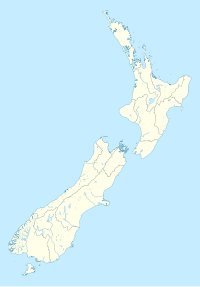Te Whanganui-A-Hei (Cathedral Cove) Marine Reserve is in the southern part of Mercury Bay on the Coromandel Peninsula in New Zealand covering an area of 840 hectares (2,100 acres).[1] On the coast of the mainland, it stretches from Cook Bluff in the north-west to the northern end of Hahei Beach in the south-east. Its offshore extremes run from Motukorure Island through Waikaranga Island to Okorotere Island and the northern end of Mahurangi Island (Goat Island).
| Te Whanganui-A-Hei (Cathedral Cove) Marine Reserve | |
|---|---|
 Cathedral Cove in 2019 | |
| Location | New Zealand |
| Coordinates | 36°49′42″S 175°47′24″E / 36.82833°S 175.79000°E |
| Area | 840 ha |
| Established | 1992 |
| Governing body | Department of Conservation |
Part of the marine reserve lies off the Cathedral Cove Recreation Reserve, which runs from the northern end of Hahei Beach in the south-east to beyond Cathedral Cove in the north-west. With attractions such as a natural rock archway and neighbouring beaches at Cathedral Cove, the area is very popular with tourists, and receives around 150,000 visitors per year.[2]
The walkway to the cove was closed due to damage from Cyclone Gabrielle in February 2023.[3] In January 2024, the Department of Conservation said they were "not confident" the track would reopen due to significant damage to the stability of the ground in the area.[4] An alternative viewing point was established, and the cove could be viewed from boats.[5] The Mautohe Cathedral Cove Track reopened on 1 December 2024. The track from Hahei Beach to the Grange Road track entrance (Hahei Beach Walk) is closed due to ongoing land instability. For your safety, do not use this track.[6]
Etymology
editThe Māori name for Mercury Bay, Te Whanganui-A-Hei (meaning the Great Bay of Hei), refers to Hei, a tohunga from the Te Arawa waka. According to tradition, Hei chose the area around Mercury Bay as home for his tribe, proclaiming ownership by calling Motueka Island "Te Kuraetanga-o-taku-Ihu" (the outward curve of my nose). It is said he made this claim near the present-day town of Hahei.[7]
In popular culture
editThe cave and beach were used as the tunnel through which the Pevensie children first re-enter Narnia in the movie version of The Chronicles of Narnia: Prince Caspian (2008).[8] The cove was used as one of the locations in the music video for the song "Can't Hold Us" (2011) by Macklemore and Ryan Lewis featuring Ray Dalton.[9] The cove was used as a wallpaper for Microsoft's Operating System Windows 10
Gallery
edit-
Cathedral Cove in 2019
-
View towards Cathedral Cove from the sea
-
View from lookout near car park over Stingray Bay to Cathedral Cove
-
View through rock arch towards Te Hoho Rock in Cathedral Cove
See also
editReferences
edit- ^ "Marine Reserve (Whanganui A Hei (Cathedral Cove)) Order 1992 (SR 1992/387)". New Zealand Government. 24 December 1992. Retrieved 16 April 2013.
- ^ O'Rourke, Simon (2 November 2007). "Billionaire in coast dust-up". The New Zealand Herald. Retrieved 18 July 2019.
- ^ "Report emphasises risks of rockfall, landslides at Cathedral Cove, Hahei", Department of Conservation - Media Releases, New Zealand Government, archived from the original on 14 January 2024, retrieved 24 January 2024
- ^ "DOC 'not confident' of Cathedral Cove track reopening", Stuff, 24 January 2024, retrieved 24 January 2024
- ^ "Cathedral Cove and Hahei updates", Department of Conservation, New Zealand Government, 19 January 2024, archived from the original on 6 January 2024, retrieved 24 January 2024
- ^ "Mautohe Cathedral Cove Track". www.doc.govt.nz. Retrieved 19 January 2025.
- ^ "Whanganui A Hei (Cathedral Cove) Marine Reserve". Department of Conservation. Retrieved 14 July 2019.
- ^ Peck, Sally (12 August 2016). "12 fantasy film locations that really exist - in New Zealand". The Telegraph. Retrieved 28 January 2021.
- ^ Wade, Amelia (18 April 2013). "Cathedral Cove stars in new Macklemore video". The New Zealand Herald. Archived from the original on 23 September 2024. Retrieved 23 September 2024.
External links
edit- Whanganui A Hei (Cathedral Cove) Marine Reserve, Department of Conservation
